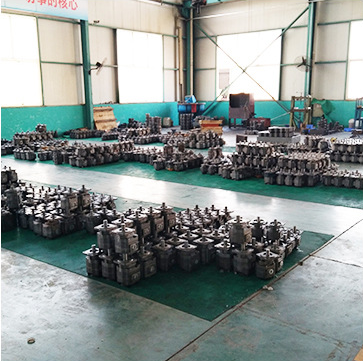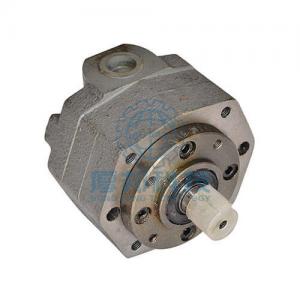Types of hydraulic pumps commonly used
Types of hydraulic pumps commonly used
1.According to whether the flow du can be adjusted, the zhi is: variable pump and quantitative pump.The output flow can be adjusted according to the needs of the root dao is called variable pump, the flow cannot be adjusted is called quantitative pump.
2.According to the hydraulic system commonly used pump structure is divided into: gear pump, vane pump and plunger pump 3 kinds.
- Gear pump: the volume is small, the structure is simple, to the oil cleanliness requirement is not strict, the price is cheaper;But the pump shaft by the unbalanced force, wear serious, large leakage.
- Plunger pump: high volume efficiency, small leakage, can work under high pressure, mostly used in high-power hydraulic system;But the structure is complex, the material and the processing precision request is high, the price is expensive, to the oil cleanliness request is high.
- Blade pump: divided into double-acting blade pump and single-acting blade pump.This pump flow uniformity, smooth operation, low noise, pressure and volume efficiency than gear pump high, complex structure than gear pump.
Parameters:
Hydraulic pump is the power component of the hydraulic system, its function is to provide pressure oil to the hydraulic system, from the point of view of energy conversion, it will be the prime mover (such as the engine) output of the mechanical energy converted to facilitate the transfer of the liquid pressure energy.Hydraulic motors are actuators that convert the pressure energy of the input liquid into the mechanical energy of the rotation of the output shaft, which is used to drag the load to do work.According to the structure form, hydraulic pump and hydraulic motor can be divided into gear type, vane type, plunger type and other types.
1.Hydraulic pump pressure
Hydraulic pump working pressure refers to the pump (or motor) in the actual work of the output (or input) oil pressure, determined by the external load.
Rated pressure refers to the maximum pressure that can operate continuously according to the test standard under normal working conditions.Its size is limited by the life, if the rated pressure work, pump (or motor) service life will be shorter than the design life.Overload is when the working pressure is greater than the rated pressure
2.The speed
Working speed refers to the pump (or motor) at work when the actual rotation speed.
Rated speed refers to the maximum speed that can run normally for a long time continuously under rated pressure.If the pump exceeds the rated speed will cause insufficient oil absorption, vibration and large noise, parts will suffer cavitation damage, life reduced.
The minimum stable speed is the minimum speed allowed by the normal operation of the motor.At this speed, the motor does not creep.
3. Displacement and flow rate
Displacement refers to the pump (or motor) every turn, by the sealing capacity cavity geometry size changes from the discharge (or input) liquid volume, the common unit is ml/ R (ml/ RPM).Displacement can be changed by adjusting the variable pump (or variable motor), displacement cannot be changed into a quantitative pump (or quantitative motor).
Actual flow refers to the pump (or motor) when working at the exit (or at the entrance).Due to the internal leakage of the pump itself, the actual flow rate is less than the theoretical flow rate.Because the motor itself also has internal leakage, in order to achieve the specified speed, in order to compensate for the leakage, its input actual flow must be greater than the theoretical flow.
4.The efficiency
Volumetric efficiency, to hydraulic pump is the ratio of its actual flow and theoretical flow.To hydraulic motor it is the ratio that points to its theory flow and actual flow.
Mechanical efficiency, on hydraulic pumps is the ratio of the theoretical torque and the actual input torque.The actual output torque of the hydraulic motor is the torque after the theoretical torque overcomes the friction force, so its mechanical efficiency is the ratio between the actual output torque and the theoretical torque.


